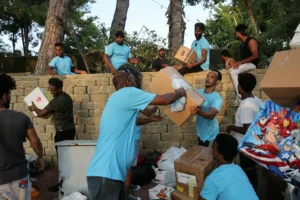Israel Is Recruiting African Asylum Seekers for Life-threatening Gaza War Operations,

Asylum seekers volunteer to help residents of the Gaza border communities, in October.Credit: Tomer Appelbaum
Israel’s defense establishment is offering African asylum seekers who contribute to the war effort in Gaza – risking their lives – assistance in obtaining permanent status in Israel. This, according to personal accounts obtained by Haaretz.
Defense officials, speaking off the record, say the project is conducted in an organized manner, with the guidance of defense establishment legal advisers.
However, the ethical considerations of recruiting asylum seekers have not been addressed. To date, no asylum seekers who contributed to the war effort have been granted official status.
There are currently some 30,000 African asylum seekers living in Israel, most of them young men. Around 3,500 are Sudanese citizens with temporary status granted by the court because the state has not processed and ruled on their applications.
During the October 7 Hamas attack, three asylum seekers were killed. In the aftermath, many volunteered for agricultural work and civilian command centers, with some willing to enlist in the Israel Defense Forces. Defense officials realized they could use the help of the asylum seekers and exploit their desire to obtain permanent status in Israel as an incentive.
A man who asked to be identified only by an initial, A., arrived in Israel at age 16, as part of the big wave of asylum seekers. The temporary status he holds provides him with most of the rights afforded to Israelis, but it must be renewed periodically with the Interior Ministry’s Population and Immigration Authority and does not guarantee him permanent status. In the past, he wanted to enlist in the army, like many asylum seekers who see the army as the best way to integrate into Israel society.
In one of the first months of the war, A. received a phone call from someone who claimed to be a police officer and who instructed him to report immediately to a security facility, without providing any explanation.
“Get here, and we’ll talk,” A. says he was told. When he got there, he realized that he had come to meet with “security guys,” as he called them. “They told me they were looking for special people to join the army. They told me this was a life-or-death war for Israel,” he told Haaretz. This was the first of what turned out to be a series of meetings with a man who introduced himself as a security official who was recruiting asylum seekers for the army. The meetings took place over the course of around two weeks and ended when A. decided not to enlist.
A. met with the official again, this time in a public place. The man gave him 1,000 shekels (about $270) in cash to cover his lost work days due to the meetings. He told him there was a two-week training period if he was drafted, joining other asylum seekers. He also promised that the pay he would receive for the military service would be similar to what he earned at his job.
“I asked, what do I get? Even though I’m not really looking for anything. But then he told me – If you go this way, you can receive documents from the State of Israel. He asked me to send him a photocopy of my ID and said he would take care of these things.”
After a date was set for A.’s enlistment, he began having second thoughts. “I wanted to go, and I was very serious about it, but then I thought – just two weeks of training and then to be part of the war effort? I’ve never touched a gun in my life.” Shortly before his training was to begin, A. told his contact that he had changed his mind. The man was angry, A. says. “He said he had expected something different from me,” but also did not completely close the door on the possibility. “He said let’s keep talking and if you want, you can join later.”
A. does not know why exactly he was contacted and not others, and says: “The guy told me they were looking for special people. I asked him what made me special, he didn’t know me at all.”
